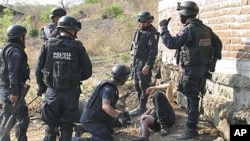The Obama administration is continuing an investigation into the Bureau of Alcohol, Tobacco and Firearms - known as the ATF - for allegedly allowing guns to be smuggled into Mexico after they had been purchased in the United States by people who were suspected of criminal activity. The allegations have fueled anger and mistrust on both sides of the border.
In testimony earlier this week before the US House of Representatives Oversight and Government Reform Committee, ATF agent John Dodson told how he was ordered by supervisors to allow guns purchased by so-called “straw purchasers” to pass on to others. He said ATF surveillance teams watched as the alleged straw purchasers re-sold the guns to others, but, he said, they were not allowed to move in and make arrests.
“I had no question that the individuals we were watching were acting as straw purchasers and that the weapons they purchased would be trafficked to Mexico and/or other locales along the southwest border or other places in the United States and that ultimately these firearms would be used in a violent crime,” said Dodson.
The incidents described by Dodson and other agents took place under an operation that the agency had dubbed “Fast and Furious” and was part of a Justice Department effort to track guns to powerful drug lords and other criminal leaders who could then be targeted for arrest. Although the idea may have been to pass over smaller fish, like the straw purchasers, in favor of capturing bigger fish, the operation ended up allowing as many as 1,700 firearms to be trafficked to criminals both in the United States and Mexico.
At least 195 of the weapons were later traced to Mexico, where a violent drug war has claimed around 40,000 lives in the past five years. Two weapons linked to the “Fast and Furious”operation were found on the scene where U.S. Border Patrol Agent Brian Terry was murdered near Nogales, Arizona, in December of last year.
Republican Senator Charles Grassley condemned the ATF operation as counter to the mission the agency was established to carry out.
“ATF is supposed to stop criminals from trafficking guns to Mexican drug cartels or, I guess, any place else; instead the ATF made it easier for alleged cartel middlemen to get weapons from U.S. gun dealers,” said Grassley.
Senator Grassley and others on the committee have complained that the ATF and Justice Department have provided little information about the gun-tracing operation, how it was conducted and who supervised it.
U.S. Attorney General Eric Holder has ordered the Justice Department Inspector General to investigate the allegation. He recently told reporters that such operations are difficult to carry out because guns can be purchased legally in the United States and federal agents need to make sure illegal transactions are involved before making an arrest.
“Now, whether there should be guns allowed to travel or let them run, whatever the phrase is, is something we have to look at and examine and that is one of the reasons I have asked the Inspector General to look at the facts and see exactly what happened and see if what happened was appropriate,” said Holder.
Among the people with an intense interest in the case are family members of Agent Terry, who are seeking answers as to why guns allegedly purchased for illegal purposes were allowed to pass on to criminals who may have used them to kill the Border Patrol agent.
Many Mexicans also demand explanations. Since the revelations about the ATF operations first came out in news reports three months ago, Mexican commentators and lawmakers have thoroughly condemned the “Fast and Furious” operations as an abuse of Mexico by the United States.
Mexican Senator Yeidckol Polevnsky of the leftist Party of the Democratic Revolution condemned it as a violation of international accords.
She said the U.S. operation violated a 1989 bilateral agreement between the United States and Mexico to cooperate in the fight against drug trafficking, as well as various other international agreements.
Even members of the ruling National Action Party, or PAN, have spoken out against the United States on this matter. PAN Senator Ricardo Garcia Cervantes called it a clear violation of Mexico's sovereignty.
He said this operation was not just an offense against national sovereignty, but a violation of Mexico's rule of law that had caused the death of Mexican citizens.
Mexican President Felipe Calderon began a national effort to stop drug trafficking and gain control over powerful criminal gangs shortly after he took office in December, 2006. In the years since then, he often has complained about guns being used by criminals in Mexico that have been traced back to gun shops in Houston, Phoenix and other US cities. U.S. Customs officials began an operation at border crossings two years ago to check vehicles traveling into Mexico for guns.
U..S government officials say little about the ATF “Fast and Furious” operations can be made public at this time because it might compromise criminal investigations and prosecutions that are now underway.
US Agency's Gun Operation Stirs Anger in Mexico, US
- By Greg Flakus




